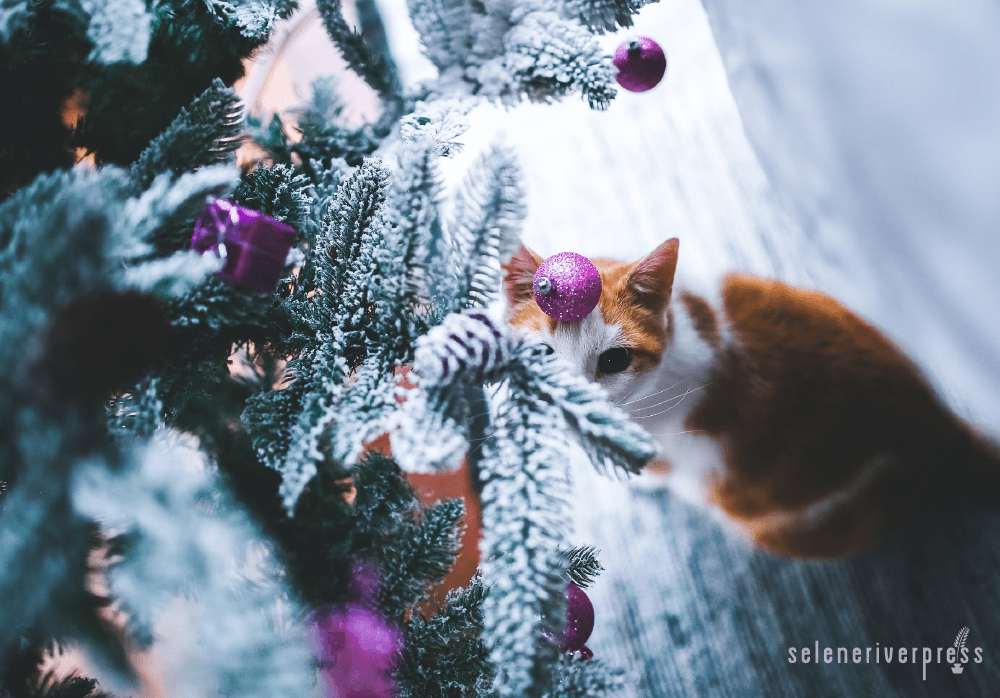Christmas is my favorite holiday of the year! I love spending time with my family and friends and taking in the Christmas lights and decorations, the gala of food, and the joy of the Christmas spirit.
However, in the midst of all the excitement, many pet owners don’t recognize the hazards our furry friends can encounter during this festive time, so it’s important to take preventive measures to protect them this holiday season. Let’s take a look at the top three dangers that pets can come across during the holidays. This knowledge could just save you a trip to the veterinary emergency room.
1. Tinsel and Glistening Ornaments
If you’re anything like me, the more lights on the Christmas tree the better. But lights and flashy decorations can arouse your pets’ curiosity—especially cats. If ingested, they can cause serious problems, including lacerations in the mouth, throat, and intestines, not to mention the choking hazard. Beware if you have a pet that likes to chew. If you’ve seen the movie National Lampoon’s Christmas Vacation, you probably remember what happened to that poor kitty. Yikes! Please keep the flashy decorations at the top of the tree and hide all cords to help your pet avoid this potential danger.
2. Food Hazards
Gatherings often mean mouthwatering treats and delicious food. Unfortunately, most of our favorite holiday goodies can be extremely toxic, or even fatal, to our pets. In most crisis situations, cases that end up in the ER are pets that tend to “help themselves” to the unsupervised food. Ingesting different types of chocolate, fat, and caffeine can cause your pet to experience vomiting, diarrhea, urination, heart arrhythmias, hyperactivity, tremors, and possible seizures. Remember that trimmed fat from both cooked and uncooked food can cause pancreatitis if the animal ingests too much or has a sensitive GI tract. It may seem natural to give a dog a bone, but dogs can choke on cooked, splintery bones. They can also become obstructed or wind up with a lacerated GI tract. Your best bet is to keep your pet on his or her regular diet and advise visitors against offering your pet special treats or table scraps.
3. Seasonal Plants
Before bringing your neighbor or friend a beautiful Christmas poinsettia as a gesture of holiday cheer, find out if they own pets. Beautiful as they are, poinsettias can cause irritation to the mouth and stomach, and sometimes vomiting as well. And although mistletoe is only mildly toxic, let me ask you this: do you think mistletoe is all about holiday romance? Think again. This joyful plant, which also goes by the name Devil’s Fuge, can cause an animal to collapse. Mistletoe can also lead to significant GI irritation, difficulty breathing, erratic behavior, hallucinations, and even death when ingested. Then of course we can’t forget about the holly and lilies. The key here is to place these plants out of your pet’s reach, or simply decorate with artificial plants.
Keep in mind that every animal reacts differently and not all types of poisoning require the same treatment. If your animal ingests something that is potentially harmful, contact your veterinarian immediately. Make sure you have the phone number readily available, along with the number for emergency and/or after-hours service. You can also contact the National Animal Poison Control Center at (888) 426-4435.
As you gear up for the holidays, don’t put so much thought into what new sweater, leash, or bowl “Fluffy” will appreciate this year. Instead, let’s remember that the best gift of all you can give to your pets is wellness—and your time. Make sure you provide your pet with Standard Process supplements every day, and be sure to share lots of quality time taking walks and playing fetch and tug-of-war.
Keep your pet safe, and enjoy a wonderful holiday season.



Good to have this info all in one place. Thank you, Tracie!